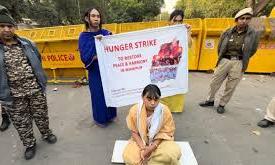
Manipur transgender activist continues hunger strike in Delhi
text_fieldsNew Delhi: Malem Thongam, a transgender activist from Manipur, has been on a hunger strike in Delhi for the past four days, demanding an end to ethnic violence in the state.
After her health deteriorated, she was taken to a hospital on Monday but later resumed her hunger strike at a gurdwara near Connaught Place.
Thongam, chief of Lamyamba Irabot Memorial Integrated Trust, initiated the fast on February 22. She was initially detained by the police along with members of the civil society group Delhi Meetei Coordinating Committee (DMCC). Despite detentions, she persisted with her hunger strike, demanding the annulment of a tripartite agreement seen as a cause of ethnic violence between Meiteis and Kuki-Zo tribes.
"We request Prime Minister Narendra Modi to come to Manipur and stop the violence. To bring peace and normalcy to the state, the Centre and the Manipur government should end the suspension of operations (SoO) agreement with Kuki-Zo insurgents," said Thongam's civil society group and the DMCC.
The hunger striker urges the authorities to engage in dialogue and provide assurances.
The ongoing ethnic violence in Manipur, fueled by disputes over land, resources, political representation, and affirmative action policies, has resulted in over 180 deaths and the internal displacement of thousands over nine months.
The activists are drawing attention to Thongam's protest, reminiscent of Irom Sharmila's 16-year hunger strike that highlighted unresolved issues in Manipur.
The SoO (Suspension of Operations) agreement between the government and Kuki-Zo insurgents is under scrutiny during a joint monitoring group review on February 29. The agreement mandates insurgents to stay in designated camps, locking away their weapons for regular monitoring.
Allegations of non-compliance with attendance and violent incidents persist at the SoO camps. The Kuki-Zo insurgent groups, represented by the Kuki National Organisation (KNO) and United People's Front (UPF), accuse valley-based armed groups of incursions into the hills, leading to the ongoing violent clashes.























